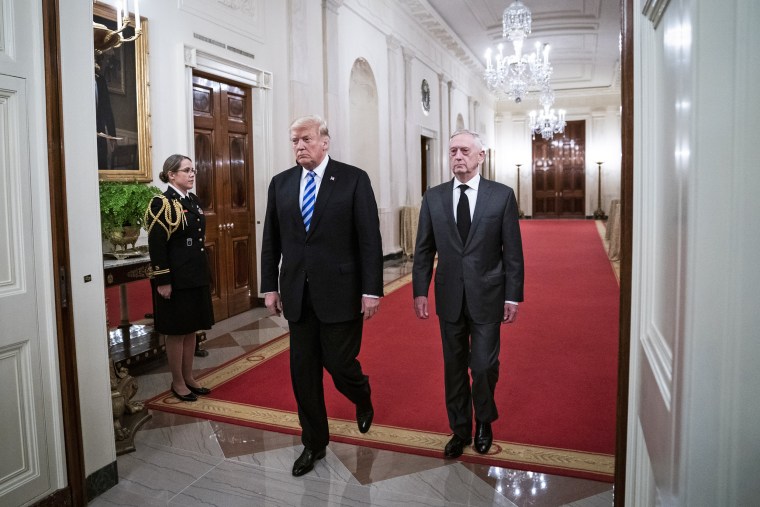James Mattis resigned as secretary of defense on Dec. 31, 2018, reportedly as a result of disagreements with President Donald Trump about his conduct and priorities vis-a-vis the military. Mattis, an honorable man and decorated Marine general who dedicated his life to serving our country, is now on a well-deserved speaking tour, promoting his new book “Call Sign Chaos.”
In a recent appearance on MSNC's “Morning Joe,” Mattis said he will follow traditions and norms by not speaking about what he personally observed regarding Trump’s behavior as commander in chief. Specifically, Mattis said he will “hold his tongue about politics.” I would argue that given what we know about the Trump administration — which just this week included explosive reports of an exfiltrated Kremlin spy and the drama surrounding the breakdown of secret Taliban peace talks — this may be the first time in his long, distinguished career that Mattis is letting his country down.
That’s a hard thing to think, let alone say publicly. Compared to Mattis, I am a military nobody. I served just over six years on active duty as an Army JAG officer — leaving the military as a captain — before continuing my public service as a federal prosecutor in Washington. As an Army captain, I was military miles away from the rank of general.
Moreover, I much admire Mattis’ inclination to be circumspect, as have many of his predecessors in the service. However, there is a danger in abiding by traditions that no longer apply to the dire circumstances that now confront our nation. Indeed, Mattis owes it to his country to speak out about Trump’s unfitness for presidential duty.
The principles Mattis chooses to follow were forged on battlefields where men and women were sent by commanders in chief who loved America and acted in the interests of freedom and democracy. Trump is not such a commander in chief, something that Mattis strongly hinted at in his resignation letter and has coyly alluded to in subsequent interviews.
The principles Mattis chooses to follow were forged on battlefields where men and women were sent by commanders in chief who acted in the interests of freedom and democracy.
By his own account, when it comes to questions of our nation’s security, Trump takes the word of Russian President Vladimir Putin over our country’s intelligence (and presumably military) leaders. Indeed, after U.S. intelligence organizations informed Trump that Russia was behind cyberattacks in 2016, Trump stood on a world stage and took Putin’s side in the fight, announcing, “I don’t see why it would be" Russia.
Trump has also claimed he “loves” Kim Jong-un, the North Korean dictator in whose care and custody American student Otto Warmbier entered into a coma from which he never recovered. Trump alienates America’s allies and pals around and even kowtows to America’s adversaries. His decision-making is so erratic he has chased away adviser after adviser, the latest being national security adviser John Bolton.
On "Morning Joe," Joe Scarborough asked Mattis directly about the president’s “competence and character to actually be commander in chief.” Mattis responded, “Political assessments should be left to the wisdom of the American people.” He further explained, “General Bradley after World War II... said that when a general retires their uniform, they should retire their tongue on these kinds of issues.” In other words, Mattis is holding fast to norms and traditions formulated during a time when American may have been well served by retired generals who practiced stoic silence and circumspection.
A supportable argument can be made that when American presidents make difficult, even unpopular military decisions, recently retired generals would do well to stay out of what are an entirely political decision. This practice of holding one’s tongue makes some sense when the president in question is a competent commander in chief who makes difficult calls based on a thorough understanding of all options and invariably is motivated by our nation’s best interests.
This is a different president and a different era. The American public deserves to know if their leader is acting in the best interests of our country.
But this is a different president and a different era. The American public deserves to know if their leader is acting in the best interests of our country, or whether he is being unduly influenced by Russia or North Korea or Saudi Arabia. The American public needs to know this information so that they can make informed decisions when voting, a choice they will have to make in 13 months.
By taking the position that he will essential "hold his tongue about politics," Mattis misses the point. Trump’s lies, his cover-ups, his money grabs and his obstruction of justice as documented in the Mueller report have absolutely nothing to do with Republican ideology or conservative orthodoxy. This is not about politics. It’s about competence and fitness, or, more appropriately, incompetence and unfitness.
Mattis’ decision to abide by traditional norms sends the message that Trump’s tenure and performance as president is no different that George Washington’s or George Bush’s or Barack Obama’s. It normalizes his behavior and reduces the scandals of the past three years to something akin to political squabbles.
I hope those close to Mattis will implore him to take on one last battle. But this is not a battle that can be won with the weapons and strategies of the 18th or 19th or 20th centuries. To borrow from a phrase now almost ubiquitous in our current climate of omnipresent danger: “General Mattis, you have seen something. Now Americans need you to say something.”
Allegiance to tradition is important. Allegiance to a safe and secure America is more important.


